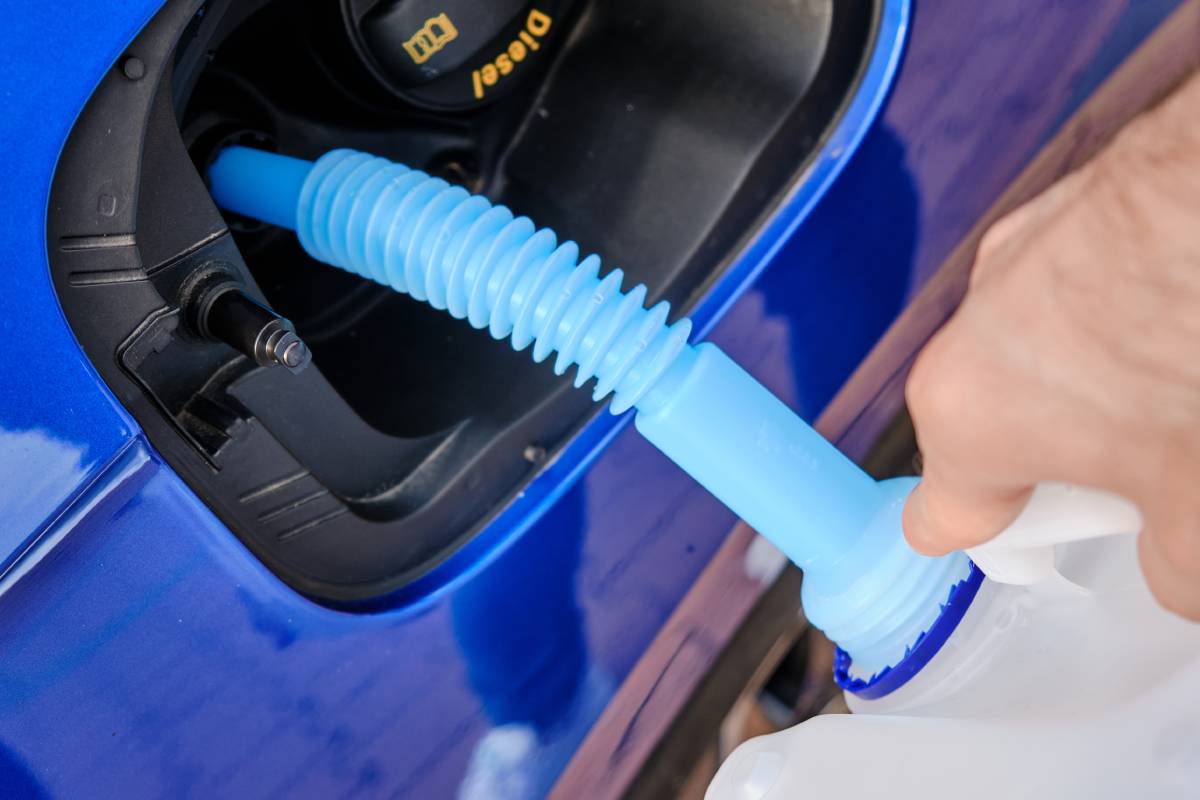The automotive industry has made significant strides toward reducing harmful emissions, and AdBlue plays a pivotal role in this evolution. If you own or operate a diesel-powered vehicle, you’ve likely come across AdBlue.
But what exactly is it? Why is it essential? Can you simply not use it? This article dives into these questions, explaining AdBlue’s role, the consequences of not using it, and how to manage its use effectively.
What Is AdBlue?
AdBlue is a high-purity solution composed of deionized water and urea. It is designed for vehicles equipped with Selective Catalytic Reduction (SCR) systems, like a newer model of skid steer, grader and other diesel engine vehicles, a technology aimed at reducing nitrogen oxide (NOx) emissions. NOx gases are major contributors to air pollution and are linked to health problems such as respiratory issues and environmental challenges like acid rain.
When AdBlue is injected into the exhaust stream of an SCR-equipped vehicle, it reacts with the NOx gases in a chemical process called hydrolysis. This reaction converts the harmful gases into harmless nitrogen and water vapour, significantly reducing the vehicle’s environmental impact.
Why Is AdBlue Essential?
- Compliance with Emission Standards
Modern diesel vehicles are required to meet stringent emission regulations, such as the Euro 6 standards in Europe and similar rules worldwide. These standards mandate that diesel engines produce lower levels of NOx. AdBlue ensures compliance by enabling SCR systems to function effectively. - Improved Environmental Impact
By significantly reducing NOx emissions, AdBlue helps create cleaner air and reduces the environmental footprint of diesel vehicles. This aligns with global efforts to combat climate change and improve public health. - Vehicle Performance and Maintenance
Contrary to some misconceptions, using AdBlue does not harm your vehicle’s performance. Instead, it allows the SCR system to operate efficiently. A well-functioning SCR system prevents excessive soot buildup and keeps the engine running smoothly, reducing wear and tear over time. - Avoiding Legal Penalties
Many countries have made it illegal to tamper with or disable emission control systems, including SCR. Not using AdBlue could result in hefty fines, legal consequences, or even the inability to legally operate your vehicle.

Can You Not Use AdBlue?
While the idea of skipping AdBlue might seem appealing to some, especially given the extra cost and hassle of refills, doing so is neither practical nor advisable. Here’s why:
- Engine Power Reduction
Diesel vehicles equipped with SCR systems are programmed to enter a “limp mode” if AdBlue runs out. This mode drastically reduces engine power to encourage the driver to refill the AdBlue tank. Operating in limp mode makes driving inconvenient and can increase the risk of accidents. - System Malfunctions
Without AdBlue, the SCR system cannot perform its primary function. This can lead to the buildup of harmful substances in the exhaust system, eventually causing expensive damage. - Legal and Warranty Implications
Attempting to bypass AdBlue systems, such as through software modifications, is illegal in many jurisdictions. It also voids the vehicle’s warranty, leaving the owner responsible for costly repairs. - Environmental Consequences
Not using AdBlue means your vehicle emits higher levels of NOx, contributing to pollution and undermining global efforts to protect the environment.
How to Use AdBlue Correctly
- Know Your Vehicle’s Requirements
Check your vehicle’s manual to understand how often AdBlue needs refilling and where the tank is located. Most vehicles provide dashboard alerts when the AdBlue level is low. - Refill on Time
Ignoring AdBlue alerts can result in the vehicle entering limp mode. Keep a spare bottle of AdBlue in your vehicle to avoid unexpected inconveniences. - Use High-Quality AdBlue
Purchase AdBlue from reputable suppliers like Ecoblue Adblue, which ensures product purity and compliance with ISO standards. Low-quality or contaminated AdBlue can damage the SCR system. - Store AdBlue Properly
AdBlue is sensitive to extreme temperatures. Store it in a cool, dry place to maintain its effectiveness. Avoid prolonged exposure to direct sunlight. - Dispose of It Responsibly
Spills can crystallize and create a mess, so handle AdBlue with care. Dispose of empty containers following local environmental regulations.

FAQs About AdBlue
1. Is AdBlue Expensive?
AdBlue is relatively inexpensive compared to the cost of potential repairs or penalties from not using it. On average, a litre of AdBlue costs between AUD 1.50 and AUD 2.50, depending on the supplier and location.
2. How Long Does AdBlue Last?
The consumption rate of AdBlue varies based on your driving habits and vehicle type. Typically, vehicles use about 1 litre of AdBlue for every 1,000 kilometres driven.
3. Can You Drive Without AdBlue?
Technically, you can’t. Once the AdBlue tank is empty, modern vehicles with SCR systems will not start or will operate in limp mode.
4. Can AdBlue Freeze?
Yes, AdBlue can freeze at temperatures below -11°C. However, SCR systems are designed with heating elements to thaw frozen AdBlue and ensure its functionality.
5. Is AdBlue Harmful?
AdBlue is non-toxic and safe to handle, though it can irritate the skin. Rinse immediately with water if it comes into contact with your skin or eyes.
Future of AdBlue and Diesel Vehicles
As the automotive industry shifts toward electric and hybrid vehicles, the reliance on diesel engines—and consequently AdBlue—might decrease over time. However, diesel vehicles remain essential in industries such as transportation, agriculture, and construction. AdBlue will continue to play a crucial role in ensuring these vehicles comply with environmental standards.
Moreover, innovations in SCR technology may improve AdBlue’s efficiency and reduce its consumption, making it even more accessible for vehicle owners.
Conclusion
AdBlue is indispensable for modern diesel vehicles equipped with SCR systems. It ensures compliance with emissions standards, protects the environment, and maintains vehicle performance. While skipping AdBlue might seem like an easy option, the legal, financial, and environmental consequences make it a poor choice.
Instead, focus on proper AdBlue usage and sourcing it from reputable suppliers like EcoBlue to keep your vehicle running efficiently. By embracing AdBlue, you’re not just adhering to regulations—you’re contributing to a cleaner, healthier planet.




